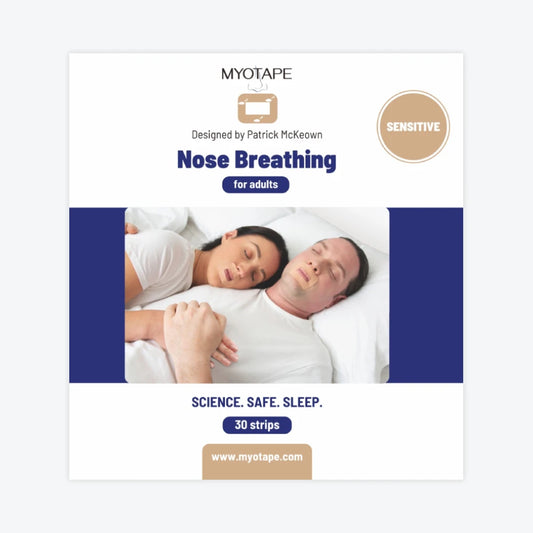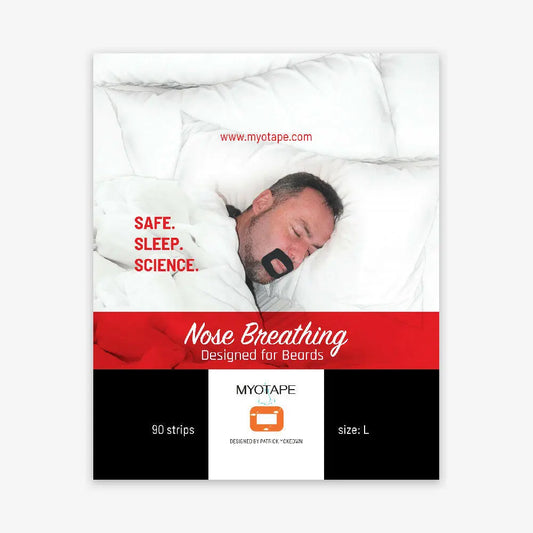Every night, millions of people struggle with snoring. If you snore or share a bed with someone who does, you know how frustrating it can be.
Snoring can leave you feeling tired, cranky, and even embarrassed. It’s no wonder so many people are searching for simple ways to stop snoring and finally get a good night’s rest.
Recently, using mouth tape to stop snoring has become a popular online trend. You might be wondering, does mouth tape help fix snoring? Or is it just another quick fix that doesn’t really work?
In this article, we’ll break down what mouth taping is, how snoring actually happens, and whether or not mouth tape can really help with snoring. If you’re looking for answers and want to sleep better, you’re in the right place. Let’s get started!
How Does Snoring Occur?
Snoring is your body’s way of signaling that your airway is facing resistance. When air struggles to pass through a narrowed or partially blocked passage, whether in your nose, mouth, or throat, it creates turbulence. This turbulence makes the soft tissues vibrate, producing the sound we recognize as snoring.
What Causes Snoring?
Snoring can be triggered by several factors, including:
• Mouth breathing during sleep
• Nasal congestion or blockage
• Overbreathing or fast, forceful breathing
• Structural issues such as a deviated septum, enlarged tonsils, or a long soft palate
• Excess body weight
• Allergies or inflammation
• Sleeping position, especially on your back
• Lifestyle factors such as alcohol, sedatives, or smoking
• Medical conditions like sleep apnea, high blood pressure, or diabetes.
Menopause can also affect sleep. Understanding these causes is important because they can affect both where and how snoring occurs.

Types of Snoring
Snoring does not always sound the same or come from the same place. The two main types are mouth snoring and nose snoring.
Mouth Snoring
Most commonly, snoring happens when you breathe through your mouth while sleeping. This pushes a large volume of air through a flexible airway and causes the soft palate to vibrate.
If you wake up with a dry mouth, it is a strong indication that you have been mouth breathing all night. Research shows that waking with a dry mouth or mouth breathing is not only bothersome, but also a sign of underlying health issues.
It is linked to poor sleep quality, excessive daytime tiredness, and an increased risk of sleep apnea and teeth grinding.
Nose Snoring
Your nose is designed to slow, warm, and humidify the air you breathe. When nasal passages are blocked by congestion, a deviated septum, or naturally narrow structures, airflow becomes turbulent.
This creates vibrations where the nasal passage meets the throat and results in nasal snoring. Blocked nasal passages disrupt not only quiet breathing but also the nose’s natural ability to filter and condition the air.
The Role of Breathing in Snoring
Snoring is not just about narrow airways. The way you breathe matters, too.
Fast and forceful breathing can transform a minor blockage into a loud snoring sound. For example, try opening your mouth and breathing in quickly.
You will feel vibrations at the back of your mouth. Now close your mouth and try to snore through your mouth.
You will find it is nearly impossible. This indicates that mouth snoring typically ceases when the mouth is closed.
However, this raises a common question: Can you still snore if your mouth is closed?
Can You Snore with Your Mouth Closed?
Yes, it is possible to snore with your mouth closed. If the blockage is in your nose or deeper in your airway, snoring can still happen even when your mouth is shut.
Nasal snoring usually sounds higher and more like a whistle, while mouth snoring is deeper, throatier, and often louder.
These differences in sound can help you figure out whether the snoring is coming from your nose or your throat. Breathing more slowly and gently through your nose can also reduce the likelihood of nasal snoring.
Now that you have learned about snoring, let’s discuss what mouth taping is all about.
Mouth Taping: What It Is and How It Works
Mouth taping is a simple technique where a small strip of gentle medical tape is placed around your lips to keep your mouth closed, encouraging you to breathe through your nose.
This is most commonly done at night to help prevent mouth breathing during sleep, which is associated with issues such as dry mouth, snoring, and poor sleep quality.
Breathing through your nose is healthier than mouth breathing because the nose filters, warms, and humidifies the air. It also helps protect your lungs and improves oxygen uptake.
Research has shown that even people who usually breathe through their mouths can often adapt to nasal breathing when their mouths are taped. Mouth taping works by gently holding the lips together, which makes it more natural to breathe through the nose.
Nasal breathing has many benefits over mouth breathing. Your nose acts as a filter, removing dust, allergens, and other particles from the air.
It also helps regulate the temperature and moisture of the air you breathe, which protects your lungs and enhances how your body utilizes oxygen.
Breathing through your nose also increases nitric oxide production, which supports blood flow and helps fight germs. So, this leads to the question: Can mouth tape stop snoring?

Does Mouth Tape Help with Snoring?
While most snoring remedies focus on keeping the airway open, how you breathe, especially at night, is just as important and often overlooked. Mouth breathing during sleep is a common cause of snoring and can make the problem worse.
For those who primarily snore through their mouth, using a gentle support tape like MyoTape can be highly effective. Unlike traditional tapes that seal the lips, MyoTape sits comfortably around the mouth, gently encouraging lip closure without blocking airflow.
This promotes nasal breathing, which can significantly reduce or even eliminate mouth snoring, leading to quieter and more restful sleep.
Mouth taping is particularly helpful for mouth snorers because it keeps the lips softly closed and trains the body to breathe through the nose overnight.
Many people notice a real improvement in their snoring and overall sleep quality with this approach.
However, it’s important to remember that not all snoring starts in the mouth. If your snoring is caused by nasal congestion or comes from deeper in the airway, mouth tape may not solve the issue.
While mouth taping works well for some, results can vary depending on the underlying cause of your snoring.
If you snore through your nose and want to reduce nasal snoring, focus on daily habits such as practicing nasal breathing, clearing nasal congestion, using tools like nasal dilators, sleeping on your side, and making healthy lifestyle changes. These strategies work together to support better sleep and easier breathing.
Things to Know About Mouth Taping and Snoring
Although mouth taping can be beneficial for snoring, it’s possible to snore even with mouth tape on. This usually happens when the snoring is related to nasal blockages or vibrations in the throat rather than the mouth.
Nasal snoring can sound higher-pitched and is often linked to things like congestion or a narrow nasal passage. In these cases, taping your mouth won’t stop the snoring.
Safety and Guidelines for Mouth Taping
If you’re thinking about trying mouth taping, keep these tips in mind:
- Use the right tape: Select a gentle, skin-safe medical tape, such as MyoTape. Avoid household or duct tape.
- Check your nose first: Make sure you can breathe easily through your nose before taping your mouth. If you have a blocked nose, clear it first with this nose-unblocking exercise, or address the cause before trying mouth taping.
- Start gradually: Try wearing the tape for a short time before bed to get used to it.
- Apply gently: Place the tape so your lips are together but not tightly sealed. Some products are designed to let you open your mouth slightly if needed.
- Stop if you feel uncomfortable: If you feel anxious, short of breath, or uncomfortable, remove the tape right away.
- Avoid taping in certain situations: Don’t use mouth tape if you’ve been drinking alcohol, feel sick, or are likely to vomit. Never use it on young children, and supervise older children closely. Check out the safety tips for mouth taping on kids.
Special Considerations for Sleep Apnea
Snoring is a common sign of sleep apnea, so if you have sleep apnea, especially obstructive sleep apnea, mouth taping can be risky. Sealing the mouth may increase airway obstruction and make breathing harder during sleep.
Some tapes, like MyoTape, are made to be less restrictive, allow for mouth puffing, and can be used with CPAP for better compliance. Always talk to your doctor or sleep specialist before trying mouth taping if you have or suspect sleep apnea.
Trust MyoTape for Quality Sleep Now
Don’t let snoring disrupt your nights or your health any longer. MyoTape is the best medical tape for mouth taping. It is trusted, safe, and expertly designed to train your body to breathe through your nose gently.
Compared to conventional mouth tapes, MyoTape is comfortable, hypoallergenic, and allows for emergency mouth opening so you can sleep soundly and safely.
If you’re serious about using tape to stop snoring, make the smart choice. Join thousands who have transformed their sleep with MyoTape. Visit our shop today, find the right fit for you or your family.
Check out our range of effective mouth taping products, designed for everyone, including mouth tape for kids, adults, those with sensitive skin, and even those with facial hair.








